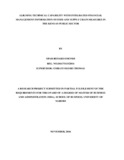| dc.description.abstract | The Kenyan Government Introduced Integrated Financial Management Information System with
aim of improving supply chain measures practices. The main aim of this study was to investigate
aligning technical capability with IFMIS and supply chain measures in the Kenyan public sector.
The objectives of the study were to determine how technical capability aligns with IFMIS and
Supply Chain Measures in the Kenyan public sector; to establish the relationship between
technical capability and IFMIS and Supply Chain Measures in the Kenyan Public sector; to
investigate the impact of Integrated Financial Management Information System (IFMIS) on
supply chain measures in the public sector. The study significantly will help to resolve some of
the challenges faced by the procurement officers, while it’s being re-engineered, thus it will act
as a source of efficiency and effectiveness in their day to day operations. Moreover, the results of
this study will enable the government to formulate strategy to ensure IFMIS implementation is
successful. The study will be based on Resource-based theory which analyzes the sources and
sustainability of IFMIS the supply chain measures. The research study adopted a descriptive
survey design. The population of study consisted of five ministries under the National
Government of Kenya, the target population of the study include the Information Technology
officers, Accountants, finance officers and procurement officers in the selected Ministries.
Primary data was collected from respondents by using questionnaire. The data was coded to
check for errors and omissions. Questionnaires responses were tabulated and processed by use of
SPSS for data analysis. Percentages and frequency tables were used to present findings and
regression analysis performed between technical capacity and IFMIS implementation elements.
Majority of the respondents reiterated that skilled manpower, implementation strategy, employee
commitment and dedication affect the Alignment technical capability of IFMIS on SCM in their
ministries to a great extent. Respondents agreed that Lack of shared information technology
vision contributes to the most severe problems in technical alignment of IFMIS and SCM in the
government ministry. Most of the respondents indicated that IFMIS introduction has reduced
manual data entry in line with the supply chain measures. The study concludes that there has
been a moderate level of technical alignment of IFMIS in the government ministries.
Traceability, Reduced corruption and Timeliness in place affect the technical alignment of
IFMIS. IFMIS forms part of the financial management reform practices of developing countries
globally. It holds benefits such as effective control over public finances, contributes to the
enhancement of transparency and accountability and serves as a deterrent to corruption and
fraud. The IFMIS should be designed to accommodate all financial transactions within the
government to reduce waste, enhance record keeping, for planning and reduction of corruption.
There is need to ensure that the requisite infrastructure are in place especially in outlying areas
out of all public sector where ICT connectivity availability is a real challenge. | en_US |



